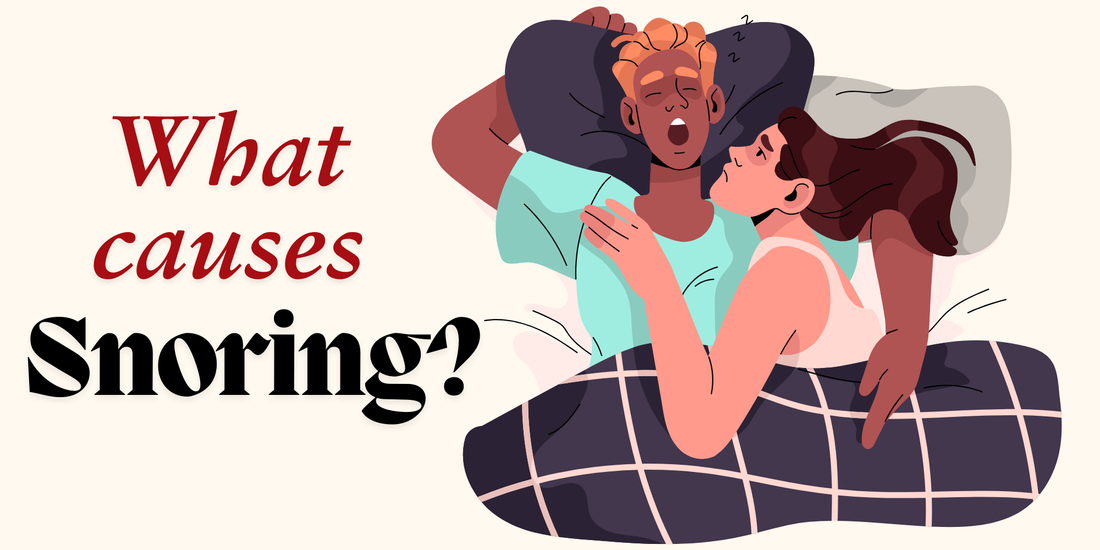
What Causes Snoring and How to Address It
Most people snore occasionally, often without even realising it. Studies show that around 44% of men and 28% of women between the ages of 30 and 60 snore regularly. While occasional snoring isn’t usually a serious health issue, it can sometimes signal an underlying condition, such as sleep apnea. Today we try to cover what causes snoring and how to address it.
Learning more about what causes snoring, how it can be treated, and when to see a doctor can be beneficial—whether you snore yourself or know someone who does.
What Causes Snoring?
Snoring happens when air flows past the relaxed tissues in the upper airway. During sleep, the muscles in the mouth, nose, and throat relax, and as air moves through, it causes these tissues to vibrate, producing the characteristic sounds of snoring, which can vary from rumbling to whistling.
Factors That Increase the Likelihood of Snoring
Understanding snoring requires figuring out the factors that can lead to snoring. Anything that narrows or blocks the airway can raise the chances of snoring. For instance, sinus infections or allergies often lead to nasal congestion, which obstructs airflow and can increase snoring.
Carrying extra weight, especially around the neck, also increases the risk, as does pregnancy in its later stages. Certain groups are more likely to snore at some point, including men, postmenopausal women, and older adults.
Other physical traits that can raise the chances of snoring include:
- Nasal polyps or growths in the nasal passages
- A deviated septum, where the wall between nostrils is crooked
- Swollen tonsils or adenoids, often seen in children
- A small mouth with a larger-than-average tongue
- A tongue with a thick base
Signs and Symptoms of Snoring
Snoring can range from soft to so loud that it disturbs others nearby. A doctor might evaluate someone who snores to look for additional signs that the airway is blocked during sleep, which might include:
- Choking or gasping for air at night
- Morning headaches
- Sore throat upon waking
- Mouth breathing
- Waking up frequently
- Feeling excessively tired during the day
Snoring and Sleep Apnea
Snoring is often associated with sleep apnea, a condition where breathing repeatedly stops and starts during sleep. However, not everyone who snores has sleep apnea. If you snore and experience other symptoms like daytime drowsiness or frequent awakenings, it may be worthwhile to consult a healthcare provider, as these signs could indicate sleep apnea.
Obstructive sleep apnea (OSA), the most common type, affects around 10-30% of adults and is characterised by repeated episodes of shallow or paused breathing. A less common type, central sleep apnea (CSA), affects fewer than 1% of people and is caused by a lapse in the brain’s signals to breathe. People with CSA may also snore.
Home Remedies for Snoring
While professional treatment is usually recommended for sleep apnea and other serious sleep disorders, a few home remedies may help reduce mild snoring:
- Avoid sleeping on your back: Try sleeping in a tight-fitting shirt with a pocket sewn on the back and put a tennis ball in the pocket to encourage side-sleeping.
- Elevate your head: Using a wedge pillow or raising the head of the bed by a few inches may help reduce snoring.
- Limit alcohol and sedatives before bed: These substances relax airway muscles, increasing the likelihood of snoring.
- Quit smoking: Smoking can irritate the airways and increase snoring.
- Manage nasal congestion: Talk to a healthcare provider before using decongestants, as some can worsen symptoms if overused.
- Maintain a healthy weight: In some cases, losing weight may reduce snoring, especially for those who are overweight.
Anti-Snoring Devices
For those needing more support, over-the-counter devices can help open the airways, easing breathing and potentially reducing snoring. Nasal dilators, both internal and external, help open up the nostrils for better airflow. Other devices like mouthguards position the jaw to keep the airway open.
For people with sleep apnea-related snoring, specialized devices may be more effective, including:
- CPAP machines: Continuous positive airway pressure therapy regulates airflow to keep the airway open and prevent pauses in breathing.
- Oral appliances: Designed to adjust the position of the jaw or tongue, these may reduce snoring for those without obstructive sleep apnea.
- Hypoglossal nerve stimulators: This more invasive option involves an implanted device that helps keep the airway open by stimulating muscles during sleep.
When to Consult Your Doctor
Though snoring is common, it can sometimes indicate underlying health conditions like sleep apnea or chronic congestion. Persistent snoring can impact sleep quality for both you and your partner, and it’s a good idea to talk to a doctor if snoring has become problematic.
Your doctor can assess how often you snore and look for any other symptoms that might point to a health issue, helping you find effective solutions for better sleep.
References:
- https://www.msdmanuals.com/professional/pulmonary-disorders/sleep-apnea/obstructive-sleep-apnea-osa?autoredirectid=20195
- https://emedicine.medscape.com/article/304967-overview#showall?form=fpf
- https://pubmed.ncbi.nlm.nih.gov/9600500/
- https://medlineplus.gov/ency/article/000811.htm
- https://www.nhlbi.nih.gov/files/docs/public/sleep/healthy_sleep.pdf
- https://medlineplus.gov/snoring.html
- https://www.uptodate.com/contents/obstructive-sleep-apnea-overview-of-management-in-adults
- https://pubmed.ncbi.nlm.nih.gov/28212691/
- https://www.msdmanuals.com/professional/pulmonary-disorders/sleep-apnea/obstructive-sleep-apnea-osa?autoredirectid=20195

